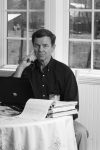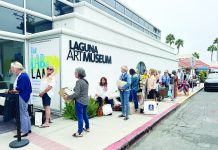America, Still Exceptional?

The acid test for my columns is to read them to the Beautiful Wife, hoping she approves. This time the BW wondered if the column wasn’t a bit . . . academic? The readers of “Finding Meaning,” I argued, are smart and curious so no problema. I leave it to you, the thoughtful reader, to decide (vote at the email below).
We had a rare occurrence this past week: Valentine’s Day landed on Ash Wednesday, the first day of Lent. The preceding day is known as Shrove Tuesday, a.k.a. Fat Tuesday due to the tradition of a pancake dinner to use up the richer ingredients of eggs, butter, and milk.
Our Neighborhood Congregational Church declared a Fat Sunday service with Dixieland music followed by crepe pancakes. Who could resist? When I entered the sanctuary, the band was playing “When the Saints Go Marching In.” I settled into a pew and enjoyed the pre-service concert, classics like “Is It True What They Say About Dixie” and “When You’re Smiling.”
The congregation was soon dancing in the aisles. I was going to say even the older ladies, but as the band rocked on all seemed young again. I imagined Congregationalism’s New World founders—those stern Puritans led here by John Winthrop, bold nonconformists in their time—smiling down. Which led me to ponder two competing concepts for faith’s place in our society.
First, we have the idea of America as a “city on a hill.” John Winthrop invoked this phrase, taken from Jesus’ Sermon on the Mount, at the Great Puritan Migration. You’ll recall that beginning in 1630 a fleet of ships brought 30,000 Puritan pioneers to plant a Zion in the stony soil of New England. It was an essential step to the creation of the world’s first democracy.
Winthrop’s “city on a hill” vision is often linked to American exceptionalism, the idea that America is uniquely different, freed from the ills of older nations, proffering a “light to the world.” This exceptionalism is often attributed to the Godly faith found in our families.
European visitors have long marveled at the vitality of religion in America. German sociologist Hans Joas noted in 2009: “The more secularized large parts of Europe became, the more exotic the religiosity of the United States seemed . . .” This vigor is compounded by our diversity. European nations sponsored state churches, but our founding fathers wisely avoided such coddling. Faith here is more competitive and thus more innovative. It’s Darwinian I suppose, but in little Laguna we are graced by 15 faith congregations who have each fought to find their place. A “city on a hill” indeed.
The secularization thesis is the competing concept. This asserts that as science and modernity advance, belief in God will become irrelevant and fade away. Perhaps they simply saw religion as “training wheels” to the future. The empty churches of western Europe are cited as proof of this theory. So, is this happening in America? You would think so if you listen to the big city media. Public polls are often interpreted as proof of America’s religious decline. To people of faith it can be disheartening.
A refreshingly different conclusion was recently argued by two noted professors. Their study shows that faith is doing just fine, thank you. Professors Sean Bock of Harvard and Landon Schnabel of Indiana University report that the percent of Americans with a “strong religious affiliation” has been holding steady at about 39% since at least 1989. (See “The Persistent and Exceptional Intensity of American Religion: A Response to Recent Research”.)
What has changed in recent years is that people with a “not strong affiliation” have felt safe to be candid and some have switched to “no affiliation.” They’re just being honest. Polls may title them the “Nones”; watchful pastors see them as the “unchurched.” But the devout 39% are, as the Apostle Paul, fighting the good fight. And, as before noted, 80% of Americans continue to profess a belief in God, even if taking a rest from church.
It’s good news that the secularization thesis is not happening in the U.S, that religion remains relevant, and that American exceptionalism endures. The morality empowered by faith is said to be a necessary foundation for democracy’s survival. So, here’s a deep thought: Perhaps some scholar will propose a new theory—that the tendency to godly belief is innate to us all, even essential to finding meaning. Imagine that.
Bio:
Skip fell in love with Laguna on a ‘50s surfing trip, and is the author of “Loving Laguna: A Local’s Guide to Laguna Beach.” A student of local history, he and wife Clare dote on their many grandchildren. Email: [email protected]
Places to worship (all on Sunday, unless noted):
Baha’i’s of Laguna Beach—contact [email protected] for events and meetings.
Chabad Jewish Center, 30804 S. Coast Hwy, Fri. 6 p.m., Sat. 10:30 a.m., Sun. 8 a.m.
Church by the Sea, 468 Legion St., 9 & 10:45 a.m.
Church of Jesus Christ of Latter-day Saints (Mormon), 682 Park Ave., 10 a.m.
First Church of Christ, Scientist, 635 High Dr., 10 a.m.
ISKCON (Hare Krishna), 285 Legion St., 5 p.m., with 6:45 feast.
Jehovah’s Witnesses, 20912 Laguna Canyon Rd., 1:00 p.m.
Laguna Beach Net-Works, 286 St. Ann’s Dr., 10 a.m.
Laguna Presbyterian, 415 Forest Ave., 8:30 & 10 a.m.
Neighborhood Congregational Church (UCC), 340 St. Ann’s Drive, 10 a.m.
United Methodist Church, 21632 Wesley, 10 a.m.
St. Catherine of Siena (Catholic), 1042 Temple Terrace, 7:30, 9, 11, 1:30 p.m. (Spanish), 5:30 p.m. There are 8 a.m. masses on other days and Saturday 5:30 p.m. vigils.
St. Francis by the Sea (American Catholic), 430 Park, 9:30 a.m.
St. Mary’s Episcopal Church, 428 Park Ave., 8 & 10:30 a.m.
Unitarian Universalist, 429 Cypress St., 10:30 a.m.




